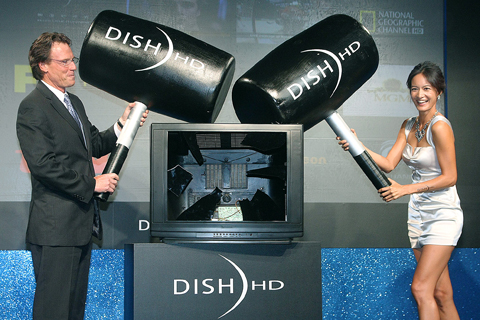EchoStar Corp, one of the top satellite TV service providers in the US, made its first Asian foray by launching its satellite TV service in Taiwan yesterday.
Dubbed “DishHD,” the service will offer 36 high-definition (HD) channels — a figure that it said is more than double those offered by local TV service providers.

PHOTO: CNA
QUALITY
“Taiwan has more than 100 channels, but the quality of these programs is behind those in other countries,” said Jared Zimmer, marketing manager of DishHD, a Taiwan division under EchoStar. “A lot of households here have a flat-panel TV, but they can’t enjoy good programs that come with HD resolution.”
Zimmer has been based in Taiwan for more than two years to oversee the DishHD project.
There are more than 200 HD channel operators in the US, but only two in Taiwan — VideoLand Inc (緯來) and HiHD service under Public Television Service (公視), he said.
HD TV refers to video that offers substantially higher resolution than conventional television systems, or so-called standard-definition TVs. HD has 1 million or 2 million pixels per frame, roughly five times that of SD. Today’s HD TV is broadcast digitally instead of in analog mode.
DishHD is also wooing other Taiwanese channel operators to launch services on its platform. It aims to increase its number of channels to 50 by the end of the year, Zimmer said.
COMPETITION
TiVo Inc, a leading US digital video recording service provider, ventured into Taiwan a few years ago but failed to replicate its success here.
Zimmer brushed off the competition, saying TiVo’s offerings are designed to allow users to record, replay, rewind or fast forward TV programs through the set-top box, while DishHD offers not only those technologies, but also serves as a TV content provider.
DishHD channels include HBO Hits, HBO Family, Channel News Asia, Bloomberg, Nickelodeon, Star World HD and NBA TV.
Information on DishHD services is available at its local dealers and hypermarket Costco branches. An upfront payment of NT$14,000 (US$433) is needed for the installation fee, the purchase of a set-top box and the satellite dish.
Subscription is NT$1,000 per month till the end of December and NT$1,200 after that.
Zimmer said there are plans to bring DishHD to other markets in Asia, but declined to elaborate. Neither did he reveal the firm’s target subscriber numbers, only saying that the service is aimed at a middle to high-end audience on the lookout for the best in international sports, entertainment and kids programs.

Sweeping policy changes under US Secretary of Health and Human Services Robert F. Kennedy Jr are having a chilling effect on vaccine makers as anti-vaccine rhetoric has turned into concrete changes in inoculation schedules and recommendations, investors and executives said. The administration of US President Donald Trump has in the past year upended vaccine recommendations, with the country last month ending its longstanding guidance that all children receive inoculations against flu, hepatitis A and other diseases. The unprecedented changes have led to diminished vaccine usage, hurt the investment case for some biotechs, and created a drag that would likely dent revenues and

Global semiconductor stocks advanced yesterday, as comments by Nvidia Corp chief executive officer Jensen Huang (黃仁勳) at Davos, Switzerland, helped reinforce investor enthusiasm for artificial intelligence (AI). Samsung Electronics Co gained as much as 5 percent to an all-time high, helping drive South Korea’s benchmark KOSPI above 5,000 for the first time. That came after the Philadelphia Semiconductor Index rose more than 3 percent to a fresh record on Wednesday, with a boost from Nvidia. The gains came amid broad risk-on trade after US President Donald Trump withdrew his threat of tariffs on some European nations over backing for Greenland. Huang further

Nvidia Corp’s GB300 platform is expected to account for 70 to 80 percent of global artificial intelligence (AI) server rack shipments this year, while adoption of its next-generation Vera Rubin 200 platform is to gradually gain momentum after the third quarter of the year, TrendForce Corp (集邦科技) said. Servers based on Nvidia’s GB300 chips entered mass production last quarter and they are expected to become the mainstay models for Taiwanese server manufacturers this year, Trendforce analyst Frank Kung (龔明德) said in an interview. This year is expected to be a breakout year for AI servers based on a variety of chips, as

HSBC Bank Taiwan Ltd (匯豐台灣商銀) and the Taiwan High Prosecutors Office recently signed a memorandum of understanding (MOU) to enhance cooperation on the suspicious transaction analysis mechanism. This landmark agreement makes HSBC the first foreign bank in Taiwan to establish such a partnership with the High Prosecutors Office, underscoring its commitment to active anti-fraud initiatives, financial inclusion, and the “Treating Customers Fairly” principle. Through this deep public-private collaboration, both parties aim to co-create a secure financial ecosystem via early warning detection and precise fraud prevention technologies. At the signing ceremony, HSBC Taiwan CEO and head of banking Adam Chen (陳志堅)